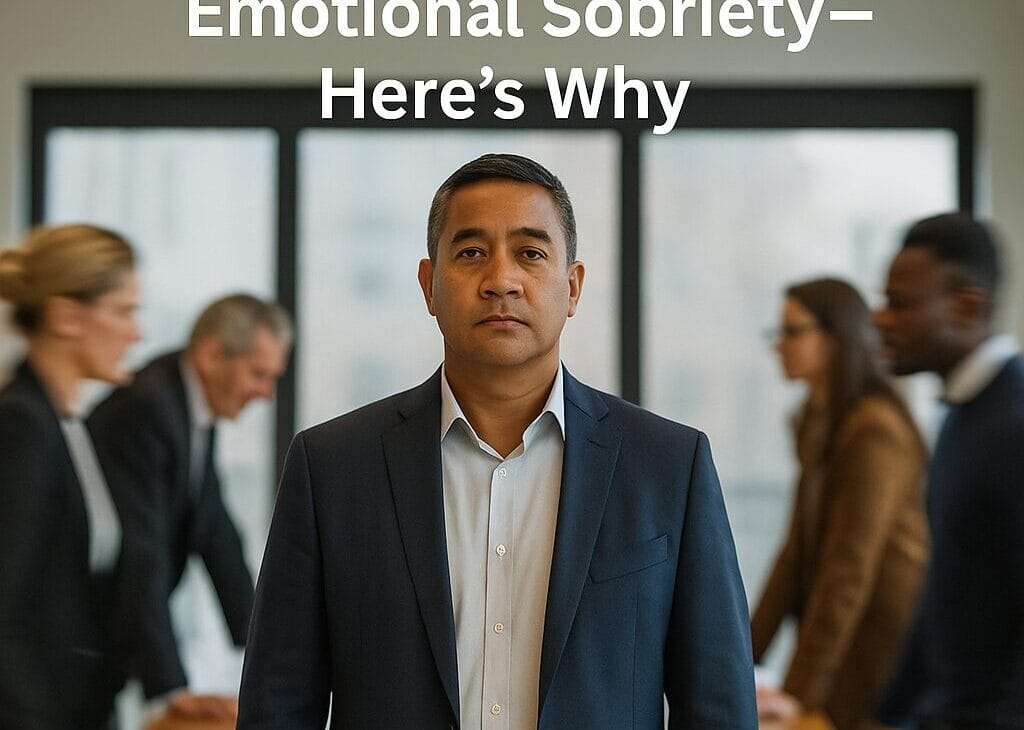- Updated: October 27, 2025
FYI: You don’t need more charisma.
Nor do you need a confidence coach.
You need to be emotionally sober.
Because the moment you step into leadership, people aren’t just watching your performance.
They’re absorbing your emotional baseline.
And whether you realize it or not—you’re either a thermometer, reacting to every spike in the room…
Or a thermostat, setting the tone.
That difference? That’s emotional sobriety.
It’s what lets you hold the room steady—even when the room is coming undone.
I didn’t always know the difference. Let me tell you why.
What We Meant, Tim…
There was a man I worked with at the Census Bureau—ex-military, easily triggered, and everyone walked on eggshells around him.
If someone said the wrong thing, he’d explode—cursing, yelling, shutting the whole energy of the room down.
And somehow, I became the one who cleaned it up.
Every time, I’d slide in and say, “What we meant, Tim…”
Eyes would dart to me for cover. I’d do the emotional translation.
And just like that—I was the fixer. The buffer. The unofficial conflict resolution specialist with zero support.
It wasn’t leadership. It was survival.
Bracing for Emotional Impact ≠ Emotional Sobriety
I thought being strong meant absorbing everything.
But what it actually did was drain the life out of me.
I’d wake up with dread in my chest before work.
Sundays felt like armor-up day.
And somehow, I thought more power—more responsibility—might make it easier.
It didn’t. It just made the mask heavier.
Because you can’t lead well when you’re constantly bracing for emotional impact or practicing toxic stoicism.
You can’t make clear decisions when your body’s in fight-or-flight.
This post isn’t about soft skills.
It’s about what happens when your nervous system is running your leadership—and how to stop performing your way into collapse.
It’s about becoming the kind of leader who doesn’t just keep the room calm—
You are the calm.
Let’s get into it.
What Emotional Sobriety Actually Means (And Why It Matters in Leadership)
Emotional sobriety isn’t about being calm all the time.
It’s not about suppressing your feelings or acting “professional.”
And it’s definitely not about pretending nothing gets to you.
Emotional sobriety is what happens when your nervous system doesn’t run the meeting—you do.
It’s what lets you respond without reacting.
Hold a boundary without exploding or over-explaining.
Feel disappointment, grief, rage—and still lead from integrity instead of impulse.

Think of it like this:
When you’re emotionally intoxicated, you overfunction, people-please, withdraw, micromanage, or self-soothe through control.
When you’re emotionally sober, you feel what’s true—but you don’t become what’s true.
You stay present.
Now notice with intention.
Next, you respond with clarity, not defense.
Here’s why it matters in leadership:
Your team is watching how you handle hard conversations.
Your clients feel the difference between confidence and performance.
Because trust isn’t built in what you say—it’s built in what you model when things get hard.
Emotionally sober leadership doesn’t mean you never flinch.
It means you stop mistaking your flinch for wisdom.
Signs You’re Leading from Emotional Intoxication (Not Sobriety)
You don’t have to be shouting in meetings to be emotionally intoxicated.
In fact, the most emotionally intoxicated leaders are often the most composed—at least on the outside.
But underneath, they’re flooded. Bracing. Trying to lead while secretly drowning in unspoken pressure, fear, or rage.
Here’s how it shows up:

1. You over-function to earn credibility.
You jump in too fast. Say yes too much.
Fix things before your team even has a chance to try.
You think it’s support—but really, it’s fear in a leadership mask.
2. You avoid hard conversations by over-explaining.
You deliver “feedback” in five layers of disclaimers.
Often, you’d pad every directive with softening language.
The cruel reality is you’d rather lose time than risk being seen as too intense, too cold, too much.
3. You make decisions reactively—then second-guess everything.
You say yes, then regret it.
Maybe you send the email, then reread it 14 times.
And it’s not uncommon for you to leave meetings thinking, “Did I come across okay?”
That’s not reflection. That’s emotional hangover from leading without sobriety.
4. You take things personally—even when you hide it well.
You hear “I need more clarity” as “You’re failing.”
You read tone in emails that isn’t there.
You smile through it—but inside, you’re spiraling.
5. You use control to manage your fear.
You send more messages. Insert yourself into more conversations.
You’re not trying to dominate—you’re trying to survive.
But the cost? You stop trusting your team.
And worse—you stop trusting yourself.
The hardest part about emotional intoxication is that it’s not always loud.
Sometimes, it’s quiet. Strategic. High-achieving.
And completely out of alignment.
The good news?
Once you see it, you can stop feeding it.
Got rage?
— Denise G. Lee (@DeniseGLee) November 18, 2024
For many, rage becomes a defense mechanism. Instead of dealing with whatever pain or vulnerability is hiding underneath, anger steps in like an overzealous bodyguard saying, “Don’t mess with me!”
It’s like using a hammer to fix a cracked vase instead of gently taping…
The Science Behind Emotional Sobriety (Yes, It’s Real)
Emotional sobriety isn’t a woo-woo concept.
It’s backed by neuroscience—and it rewires how you respond to stress, conflict, and emotional triggers.

When you practice emotional sobriety, you’re strengthening the connection between your prefrontal cortex (your rational mind) and your amygdala (your threat detector).
The result? A leader who doesn’t collapse under pressure—or overreact to every emotional spark.
Dr. James Gross of Stanford defines emotion regulation as our ability to “influence which emotions we have, when we have them, and how we experience and express them.”
In other words: you’re the one in the driver’s seat. Not your fear. Not your mood. Not your past.
Clinical psychiatrist Dr. Dan Siegel calls this integration—the ability to be “flexible, adaptive, coherent, energized, and stable.”
Sounds like the kind of leadership teams actually trust, right?
And neuroscientist Dr. Richard Davidson has shown that consistent emotional regulation literally changes your brain structure—reducing anxiety, improving clarity, and increasing long-term resilience.
So yes—emotional sobriety isn’t just for therapy sessions.
It’s a high-performance tool every leader should know how to use.
Stop shrinking yourself.
— Denise G. Lee (@DeniseGLee) December 2, 2024
Some people will never understand your growth. And that’s okay.
You don’t need to explain nor justify your evolution to anyone. Healthy people grow. Enough said.
Just KEEP IT MOVING....
What Happens When You Lead with Emotional Sobriety
Once you stop leading from emotional intoxication, everything shifts.
The overthinking quiets. The resentment fades. The team tension settles.
You stop managing chaos—and start modeling clarity.
Here’s what emotional sobriety gives you in leadership:

1. You make decisions without spiraling.
You don’t second-guess every choice. You trust your internal compass.
You’re able to say, “That was enough.”
You sleep at night because your integrity isn’t on the line every time you hit send.
2. You become someone your team feels safe around.
Not just liked. Safe.
They don’t flinch when you walk in.
They don’t code-switch around your mood.
You become a nervous system anchor, not another variable to manage.
3. You stop over-functioning to earn your worth.
You no longer take on everyone’s emotional mess.
Next, you stop trying to prove you’re valuable by doing the most.
Now is the time to lead from wholeness—not hustle.
4. You create calm without performing it.
You don’t fake peace. You embody it.
That doesn’t mean you’re never intense. It means you’re never unsafe.
5. You start trusting yourself again.
When your emotions don’t run you, your clarity returns.
You are ready and willing to ask the better questions.
You can discern what’s yours, what’s theirs, and what needs to shift.
Leadership becomes less about managing people—and more about stewarding energy with wisdom.
Emotional sobriety doesn’t make you soft.
It makes you clean.
Present. Respected.
And the kind of leader people can finally exhale around.
FAQ: Emotional Sobriety for Leaders
Q: Is emotional sobriety just another way of saying “stay calm”?
A: No. Emotional sobriety isn’t about faking calm—it’s about having the inner capacity to stay present, even when things feel heated. It’s not stillness for show. It’s regulation from the inside out.
Q: What if I’m leading well already—why would I need this?
A: You might be leading well—but are you leading cleanly? Emotional sobriety isn’t about being functional. It’s about being aligned, regulated, and trustworthy under pressure. That’s the next level most leaders never access.
Q: Is this just for women or “empathic” leaders?
A: No. Emotional sobriety is for anyone responsible for decisions, people, or outcomes. It’s what lets you lead without bleeding, speak without performing, and correct without collapse. Masculine, feminine, introvert, extrovert—it fits everyone who’s done with leading from adrenaline
🧠 Final Thoughts
You can’t lead well when your nervous system is in survival mode.
You can’t think clearly when your worth is tangled up in every decision.
And you can’t build trust when your presence depends on how much pressure you’re under.
Emotional sobriety is what makes leadership sustainable.
Not because you never feel—but because you stop letting your feelings run the show.
You’ve already led through chaos.
Carried way more than you should have.
And you did it all calmly while silently unraveling.
Now?
You get to do it differently.
Cleaner. Clearer. Real.
When others can’t take responsibility, your stability becomes the standard. Making Peace With People Who’ll Never Apologize explores how to keep leading from clarity instead of depletion.
Because the people you lead don’t need a hero.
They need someone who can stay—even when things get hard.
And that someone? Might just be you.
Dig Deeper
If you’re ready to lead from emotional sobriety instead of survival mode—I’d be honored to walk with you.
💛 Work with me, Denise G. Lee – Together, we’ll untangle what leadership has cost you emotionally and help you rebuild systems rooted in clarity, boundaries, and inner trust.
👉 Start your healing leadership journey
🎙️ Want more grounded leadership insights?
Listen to my podcast for real talk about emotional weight, visibility, and leading with your integrity intact.
👉 Introverted Entrepreneur – wherever you stream
💌 Have thoughts, memories, or questions from this post?
I’d love to hear from you.
👉 Send me a message
And just in case no one reminded you lately:
Real leadership isn’t loud.
It’s grounded. Honest. Sober.
And it starts inside you.



